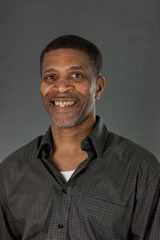Roosevelt’s Biography
Like many smokers, Roosevelt started experimenting with cigarettes in his teens. But his addiction became entrenched during his time in the military. Nearly 30 years later, damage from smoking began to take its toll. At 45, Roosevelt experienced a heart attack that landed him in the hospital for a month. In order to repair the damage to his heart caused by smoking, doctors inserted stents into his heart. When that wasn’t enough, he had bypass surgery — six bypasses in all.
“A heart attack feels like a hand inside squeezing your heart,” he says. “It’s like the worst charley horse you can imagine — in your heart.” Roosevelt found cigarettes to be so addictive that even after his surgery he continued to smoke — but he noticed an ominous difference.
“After my heart attack, when I smoked I could feel the damage right to my heart,” he says. “With all that scar tissue, I could feel pain when I inhaled smoke. I quit smoking because I didn’t want to kill myself.”
Now 51, Roosevelt has been smoke-free for 3 years, but he’s had to give up his career as a commercial plumber because his heart no longer is strong enough for the strenuous activity such work requires. He says the love, support — and constant nagging — of his family was the key to him being able to quit smoking.
“If you have loved ones who care about you, they will support you. Take it one day at a time,” Roosevelt says. “But if you smoke and want to see your kids graduate and want to see your grandkids someday, stop smoking.”
Roosevelt hopes his participation in the Tips From Former Smokers® campaign can help save lives. “I wish I never smoked,” he says. “Everybody thinks [health problems] won’t happen to them, but they happen to so many people. You could be next.”

Roosevelt, 51, Virginia; had a heart attack at age 45
Get the Facts
More Stories
- Page last reviewed: May 30, 2017
- Page last updated: August 4, 2017
- Content source:


 ShareCompartir
ShareCompartir
